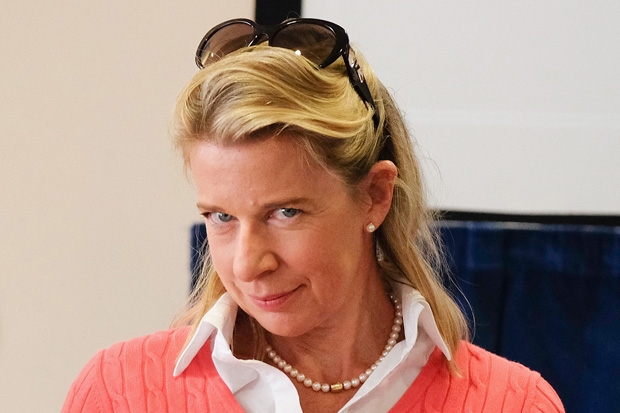Katie Hopkins did something dreadful this week, which is not unusual, because she craves such things. She retweeted praise — also not unusual, for she is narcissistic for a masochist — from a Twitter account called AntiJuden SS. The page even featured a swastika, should AntiJuden SS not have been clear indication enough. For Hopkins, however, neo-Nazi praise is a dog making love to your ankle. It would repel most people, but for her it still counts. Fake outrage begat fake outrage and Hopkins de-tweeted the retweet, and apologised: ‘My New Year’s resolution is to show contrition.’ To show contrition, not to be contrite; that is quite precise for Hopkins.
I am not sure that this retweet was deliberate, and part of Hopkins’s dimly felt — but never acknowledged — strategy to win attention of any kind. (Daddy issues surely, but I would not insult her by suggesting there are lines she will not cross. I am too busy marvelling both at her physical resemblance to Dolores Umbridge of the Harry Potter novels — a fascist in twinset and pearls — and her suggestion, also made this week, that she loves ‘language’, a sentiment disembowelled by every sentence she publishes.) No, I think rather that she retweeted the desolate AntiJuden SS because, essentially, she is not a journalist. She is a brand, a neurosis, a paradigm, a gobshite — call her what you will — but she is not a journalist. She is a former contestant on The Apprentice. There were three clues to the agenda of AntiJuden SS but the anti-journalist Hopkins — an obscurer, not a teller, of truth — missed them all. She gave neo-Nazism a national platform and, worse, she did it by mistake.
The truth is, rather, that Hopkins will soon cease to be an oddity in British journalism; we can expect to see her impersonators multiply, and the national conversation will regress to mere screaming. There have been women talking rubbish in print for many years but they have, until recently, been a minority, published most often because an editor found them physically exciting, or they sanctified his oblivious misogyny. Now, common narcissism and identity politics (my opinion is as important, and therefore as valuable, as yours), celebrity culture — the comedian, the actor, the TV presenter columnist — and the desperate quest to monetise the web throws journalism open to the idiot class; and idiocy begets idiocy. (The more idiots are published, the more they belong.) I may cherish Simon Jenkins writing about his existential search for a parking space, and Max Hastings on British Airways cutlery, but only because I know they can turn instantly and write something marvellous. They release their curmudgeon twice a year in order to prevent themselves from going mad, and I do not judge them for it.
Press regulation will make British journalism yet more secure for the idiot columnist, for what else will fill our pages and fly out to Twitter and beyond, bringing forth advertising revenue? (Hopkins is so valuable to Mail Online that £150,000 of libel damages for falsely describing members of a Muslim family visiting Disney World as extremists did not even elicit a public reprimand.) If section 40 of the Crime and Courts Act 2013 — the clause that could make news publishers liable for all the costs of a libel trial, whatever its outcome, unless they sign up to Max Mosley’s idiotically named regulator, Impress — is triggered after the consultation period ends next week, real journalism, as colleagues have noted on these pages, will self-censor. It will become one great, ghastly copy of High Life magazine; it will die. Stories that threaten the powerful — that is, the only stories that matter — will not be published or even commissioned. Where will journalism go for its drama? To the columnist retweeting neo-Nazis by mistake, to stories about Richard Hammond calling ice-cream ‘gay’ — who cares what a man willing to be photographed with Jeremy Clarkson and a goat holding a steering wheel thinks about anything? — to marketing disguised, ever more poorly, as disclosure.
An essential trade will fall into a pottage of stories about neoliberalism and croissants. There will be listicles. I have one ready: Eleven Great Newspapers That Closed in the Early 21st Century. Because the People Were Asleep.







Comments